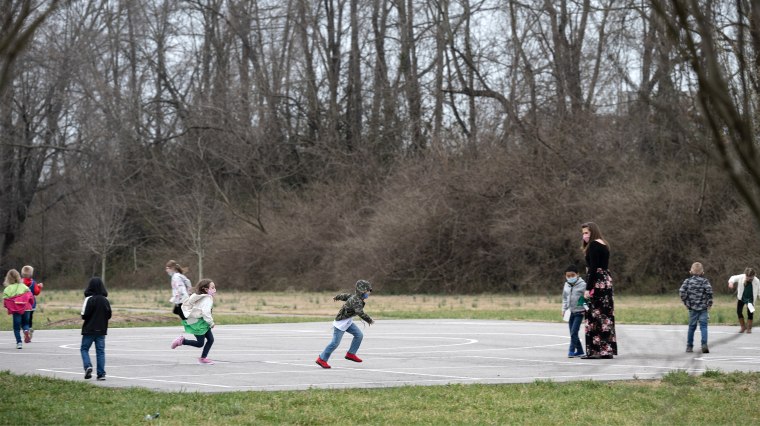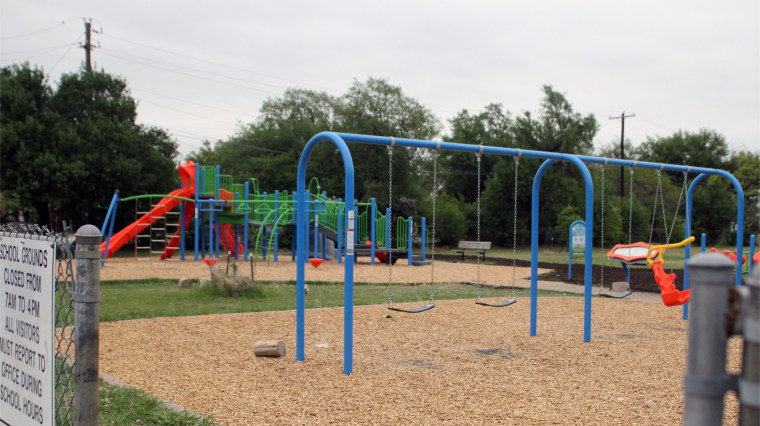Advocates for disability rights and experts in child development say withholding recess is a type of “shadow discipline,” informal punishments that are rarely recorded.NBC News / Getty Images; The Hechinger Report
This article about recess was produced by The Hechinger Report, a nonprofit, independent news organization focused on inequality and innovation in education. Sign up for Hechinger’s newsletter.
In Florida, kids in a second grade class were told to walk laps during recess after no one confessed to taking money from a classmate. In Kentucky, a first grader who hadn’t been paying attention in class had to sit on a bench next to his teacher and watch his friends play. In Texas, after a few students misbehaved, an entire first grade class had to sit inside silently for recess.
Amid long, structured school days filled with academic demands, recess serves as a critical outlet and break for kids, according to pediatricians and child development experts.
But, on any given day, an untold number of children in elementary schools nationwide have all or part of their recess revoked for infractions such as failing to finish their work, talking out of turn or not following directions. The long-standing and common punishment in schools occurs even though the practice flies in the face of considerable research supporting the importance of free play for young children.
Recently, there has been growing momentum to pass laws to protect recess time. Lawmakers in Connecticut, Pennsylvania, Oklahoma and Minnesota introduced bills over the past year to prohibit schools from withholding recess as a punishment.

If successful, these states would go further than nearly anywhere else in the U.S. in banning the practice. Eleven other states and Washington, D.C. — as well as districts including the Austin Independent School District in Texas and the New York City Department of Education — have laws or policies that limit how teachers can use the punishment, but few have outright bans.
Most states still allow the practice, and in places that restrict it, enforcement can be rare. Even in states that mandate physical activity or recess time, some parents report their children still sometimes lose entire recess periods. Overwhelmed educators have pushed back against losing disciplinary options or have continued withholding recess, with few consequences.
The Hechinger Report spoke to 18 parents and students and collected 60 additional examples from parents and teachers nationwide via social media and public testimony, all detailing the stories of young students who lost recess time — including in states without laws addressing the practice but where official guidelines advise against the punishment and in districts where it is prohibited.
“When it happened to my child, my first thought was, ‘Is this legal?’” said Maren Christenson Hofer, who said her son, who has autism, lost recess more than once in kindergarten in Minnesota. “My second thought was, ‘Has this person ever met a child before?’”
Advocates for disability rights and experts in child development say withholding recess is a type of “shadow discipline,” informal punishments that are rarely recorded. Similar methods include silent lunches and making children stand outside the classroom. While other forms of discipline, such as suspensions and expulsions, can also be detrimental to children, they’re formally reported, with data that is transparent to parents and the public.
But because shadow discipline methods aren’t tracked in the same way, it’s hard to know who receives these punishments or which schools use them most often. One survey found that 86 percent of teachers in the U.S. have decreased or taken away recess as a punishment for bad behavior.
Related: Kids can learn more from guided play than from direct instruction, report finds
There are myriad reasons why recess continues to be revoked. Dealing with challenging student behavior can be exhausting for teachers who work long hours and, in many cases, lack support in responding to student misbehavior. In some cases, the directive comes from the top. School districts nationwide have made recess detention part of their formal discipline policy, which in many cases is included in student handbooks.
Part of the appeal is that taking away recess can be a quick way to get some kids to comply, experts say.
“I don’t really believe it’s the teacher’s intention to damage the children,” said Rebecca London, an associate professor of sociology at the University of California, Santa Cruz, and the author of the book “Rethinking Recess.” “I think they use it as a threat because it’s the time kids want the most.”
Still, the practice has long been identified as harmful. In 2013 the American Academy of Pediatrics released a position statement on recess stressing that it “not be withheld for punitive or academic reasons.” Recess, the group argued, is a “crucial and necessary component of a child’s development.”
‘Let them be kids’
In Midland, Texas, Rachel Davis said her two children have lost recess numerous times over the past four years. Instead of playing, they have been told to walk laps or have had to stay inside to finish work.
“It’s so unnecessary,” Davis said. “Let them be kids.”
Experts say that while walking laps gives children an opportunity to engage in physical activity, it makes that activity a negative, rather than a positive, experience.
Withholding recess as a punishment can negatively affect a child’s relationships with teachers, feelings about school and sense of self-worth. It is a punishment that is especially stigmatizing and visible to their peers, child development experts say.
Related: How PE teachers are tackling ‘physical learning loss’
“That has potential repercussions in terms of their willingness to go to school, their attachment to school and the benefits they get from it,” said Dr. Marc Gorelick, president and chief executive officer of the pediatric health system Children’s Minnesota.
Last September, when Davis’ 8-year-old son returned to school after recovering from Covid, Davis said he came home and had a “complete and absolute meltdown.” Her son told her he wasn’t allowed to go to recess or any special classes that day, like art or physical education, and instead had to sit and make up the work he had missed.
“This is absolutely ridiculous,” Davis said. “Haven’t we given up enough of our child’s day without having to fight to protect recess?”
Davis called the principal at her son’s school, who agreed to allow him to go to recess and specials. But two months later, in November, her son’s teacher emailed Davis and said he would be staying in for part of his recess to redo a final draft of his writing project because it was “not final draft quality.” Davis was furious. “He is not going to stay in nor is that okay!” she responded in an email.
Related: Sent home early: Lost learning in special education
Elana Ladd, spokeswoman for the Midland Independent School District, said the district does not have a policy on withholding recess. The district follows state code, which requires elementary school students to have 30 minutes of physical activity a day, which could include recess or a physical education class.
There have been efforts in Texas to legally protect recess. In 2019, Texas Gov. Greg Abbott, a Republican, vetoed legislation that would have required districts to create a recess policy that included required recess time and addressed recess withholding. Abbott said in a statement at the time that he appreciated the bill’s “good intentions” but argued it would have amounted to “bureaucracy for bureaucracy’s sake.”


